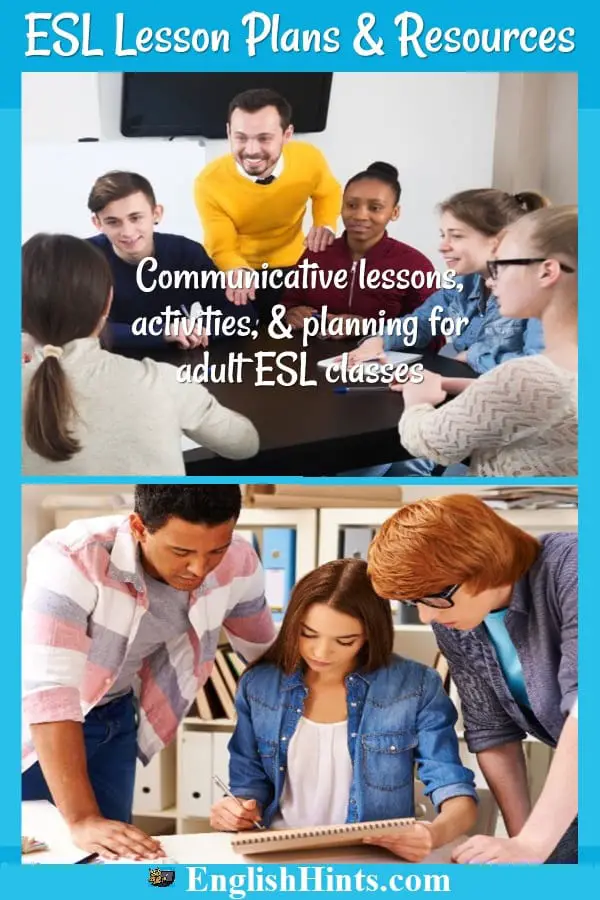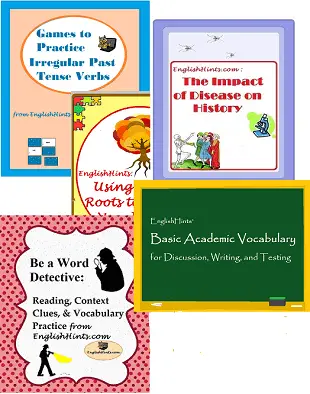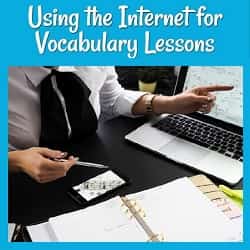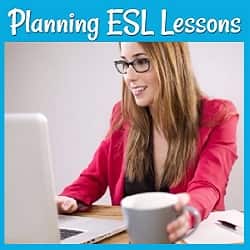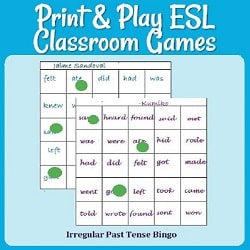Tested ESL Lesson Plans & Help
Check out our ESL lesson plans and resources if you're an ESL or EFL teacher looking for quick ideas or activities.
Much of EnglishHints.com is for Intermediate to Advanced ESL students studying independently.
Many of those pages have ideas teachers could use too. (See the pdfs from the practice pages. Most are also on Free Printable Worksheets.)
I've also converted some to a classroom-friendly form. See ESL Worksheets and individual pages:
- Reading Comp Lesson Plans,
- Academic Vocabulary Worksheets & other practice (most with lesson plans to use them),
- English Grammar Worksheets,
- ESL Classroom Games,
- Prefix, Suffix, & Root Worksheets, &
- Use Spanish Cognates to Learn or Teach English
Friends teaching ESL, often in countries with limited school resources, have asked me for hints and ESL lesson plans. So I added this section for ESL teachers.
It includes planning basics, favorite classroom activities, and lessons. I also recommend the books and sites I’ve found most helpful in over fifteen years of ESL teaching and web-surfing.
Go directly to the free lesson plans.
Other Useful Pages for Teachers
In other sections of EnglishHints you'll find:
- vocabulary, word-formation, & idioms,
- grammar,
- readings and ideas for teaching reading,
- practice exercises and games.
The ESL Games section has several pages with ideas for classroom games. There's one page specifically for teachers: Printable ESL Classroom Games.
ESL Worksheets are also for classroom use, from upper elementary to adult classes. They're useful in classrooms in English--speaking countries or in EFL classes anywhere.
Many are free. There are also some inexpensive packets. Most include lesson plans or suggestions besides the student exercises. Most include games, reading passages, or links to reading or listening activities.
Many of them center on a specific topic (to allow repeated exposure to the main ideas and vocabulary).
You are welcome to reproduce any of these activities or lesson plans for individual or classroom use. However, they are copyrighted and you may not sell them or use them on another website.
Are You Looking for an ESL/EFL Job?
There are a number of good pages and sites that can help if you’re looking for a job as an ESL or EFL teacher. (ESL is English as a Second Language, and EFL is English as a Foreign Language-- taught in a country where English is not the main language.)
I want to mention two that I'm familiar with & think would be useful. I'm sure there are other excellent pages as well, but I've checked these out myself. (These aren't affiliate links-- I don't receive any payment from them, but I would have found them helpful when I was looking in 2009...)
If you are wondering about working online, check out Start Teaching English Online. It's a guest post by TEFL.org, but I've gone over it carefully and I think the information is very useful.
If you are looking for actual ESL/EFL jobs, either in your area or overseas, check out Jooble.org. The link is to tutoring jobs, but they have a variety of classroom jobs on other pages to look through as well.
Please let me know if you try either and find it helpful (or not!)
Resources for Planning
Success in teaching begins with planning. Your school may provide you with a curriculum. If not, learn your students' needs and priorities. Think about the best ways to build on what they already know and help them reach their next goals.
An informal survey at the beginning of class is a good idea. This can be as easy as asking each student a few questions. You could also make or find a simply-worded questionnaire,
(With beginning students use the students’ native language or a picture checklist. Show icons or pictures of different possible language uses, with English captions.)
Knowing that the class will focus on (or at least consider) their needs and preferences is a great student motivator.
Once you have a basic idea of what topics to teach and when, you need to make or find lesson plans to teach them. See See Planning ESL lessons and Using the Internet for Vocabulary Lessons for pointers on making your own.
You might start with some adaptable ESL activity ideas and ESL conversation starters. You can also download lessons from many Internet sites. (See ESL Teaching Resources.) Consider ways to adapt them for your students' specific needs and interests.
If you are planning a reading lesson, see Reading Comprehension Strategies. It suggests pre-reading preparation and post-reading comprehension checks. See Improve Reading Skills for ways to help students learn specific reading skills. (Skimming, decoding, using context clues, or making inferences.)
ESL Lesson Plans on EnglishHints

The lesson plans for ESL students below demonstrate some of the skills needed to plan a good lesson.
(Some use slightly different formats as I wrote them for different purposes. Unless your school requires a certain format, use the features that you find most helpful.)
Beginning (or multi-level) ESL Lesson Plans
- Lesson Plan on Clothing Vocabulary and Shopping: Teams design clothing stores. Then they “shop” at each others’ stores. This was a favorite lesson in my adult classes year after year.
- Lesson Plan Introducing the Present Continuous Tense. (lots of acting out and miming, discussing pictures, reading, and writing.)
- An A2 level Listening lesson plan with comprehension questions using a few TED talks on hope.
- A related listening lesson (or partial lesson) on a TED talk on the Dangers of a Single Story.
Intermediate Lesson Plans
- Vocabulary Lesson Plan on Goals (with ideas for several related lessons.)
- Reading Comprehension Lesson Plans include several lessons on diseases in world history. Besides the reading selections & comp. questions, there are videos & a web quest. They take from 1-2 days to 2 weeks and cost from $2.00- 8.00. (The $8.00 packet includes all the lessons.) Two Word Detective packets teach important comprehension skills like decoding and inferences. There are also free lesson plans.
- Lesson Plan on the Columbian Exchange (listening comprehension, reading, and perfect tense practice.)
High Intermediate to Advanced Plans
- Lesson Plan on Motivation,
- Vocabulary Lesson Plans (several full lesson plans and ideas for others)
I'd suggest modifying these (or any) lesson plans to meet the particular needs of your class. I don’t think I ever taught the same lesson twice without modifications. Still, they can save time and maybe inspire other ideas.
Free Lesson Plans from Other Sites
I've come across many sites with excellent ESL lesson plans-- too many to list here. But I was impressed by the variety of lesson plans (& sites) suggested by 64 Free Lesson Plans. Some are more useful than others, but if you're not sure where to find a certain type of lesson, it's a place to start. You just might find a site you'll use repeatedly!
My Favorite (& Free!) ESL Lesson Planning Resource
Here's the single most helpful resource for adult ESL lesson plans that I have used-- and it’s free! Another teacher shared it with me, and for years I didn’t know that it was available online... My students and I have found many of these lessons especially helpful.
The L.A. Unified’s Tools for ESL Lesson Planning has great explanations of the most useful ESL techniques. It also has 35 (2 1/2 hour) sample adult ESL lesson plans. It is a 176-page pdf, so allow a little while for it to load.
There’s one plan each for 5 different levels in 7 competency areas:
- personal information/interaction,
- consumer education,
- community,
- health and safety,
- occupational knowledge,
- civics, and
- learning skills.
They provide clear plans and two reproducible hand-outs for each lesson.
These lessons are designed for adults living in the U.S. Most would be easy to adapt for other English-speaking countries or EFL classes. Quite a few would work for younger students as well.
I have tried (and/or combined/modified) more than half of them and highly recommend them. If you have a much shorter class time, it's not hard to shorten them, or divide them into 2 lessons.
My favorite lessons from them:
Beginning Low:
- “Are you feeling OK?”
Beginning High:
- “What do we need at the store?”
- “What’s Shaking?”
Intermediate Low
- “I need to report a crime!”
- “She Can’t Breathe!”
- “First, insert the originals”
Intermediate High:
- “Fill out a medical (history) form.” This lesson is reviewing the present perfect tense. So another good warm-up is a “Find someone who has _____..." (Fill in the blanks with "had a particular disease," "broken a bone," "had a vaccination," etc.) If you;re making it into two lessons, this might be the first. Students could role-play interviews with ‘the doctor’ for a second lesson
- "Get the job!" (an interview)
Advanced Low:
- “America the Beautiful”
I’d recommend printing the sections of the pdf that you intend to use. That way it’s handy when you want to refer to a particular lesson or print some handouts.
______________________________
Where to go next? Check out ESL Worksheets. It has free and inexpensive lessons, exercises, and games. There are exercises for vocabulary, roots and affixes, irregular verbs, +. (Some lessons have integrated reading/writing as well.)
Didn't find what you
needed? Explain what you want in the search box below.
(For example, cognates, past tense practice, or 'get along with.') Click to see the related pages on EnglishHints.
| site search by freefind | advanced |
